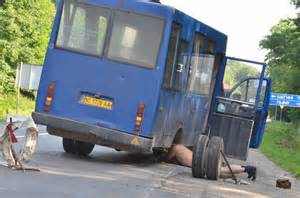A major dispute is underway in the western Ukrainian city of Khmelnitsky where the transport workers have organised in the Confederation of Free Trade Unions of Ukraine (KVPU). Pavlo Vezdenetsky is an organiser of the KVPU who has been campaigning in the city. In response the management are now victimising the union representative Anastasia Podpruzhnikova, falsifying her sick record and she has been threatened by Police. The Ukraine Solidarity Campaign calls for support for the Ukrainian transport workers (see ukraine solidarity).
Ukraine’s transport sector is repeating the mistakes of Thatcher’s public transport reforms in the UK.
After the fall of Soviet Union in 1991 public transport entered a difficult period. The disintegration of the post-soviet Ukrainian economy saw a sharp deterioration of public transport and especially working conditions. There was no investment in a new fleet and drivers salaries were very low – at a level 30-40$/month. (Yes forty dollars per month). The established soviet trade unions didn’t try to fight against these unfair conditions, under the previous communist regime their role were only to help keep workers under Communist Party control and to provide some benefits (organising of summer vacations, workers health centres, etc.).
The Soviet Union had biggest trolleybus system in the world, and even today Ukraine has many cities where electric transport is in operation. For example longest trolleybus line in the world – “Yalta-Simferopol” – is situated in Ukrainian Crimea (now occupied by Russians now).
Large scale of systems, developed infrastructure, special fare for electric energy (only 3.5 American cent/kWt*hour) could make trolleybus transport in Ukraine successful. But have not. Why?

On Ukrainian streets a European European tourist would encounter a very strange public transport system – “marshrutka”. It is the Ukrainian word meaning a small uncomfortable private bus, where pensioners have to pay (in contrast to free of charge for a municipal trolleybus or bus for them ).
This unequal competition of private greed and public need seems to be the main problem. When a crowd of pensioners is waiting for a trolleybus, other passengers choosing “marshrutka” leaving their money in private hands. Compensations for fare free passengers from state budget are delayed, and this leads to salary delays at municipal owned companies.
The problem is even more complicated because Ukrainian local authorities are very corrupt and interested only in enlarging private transport. When private transport companies belong to local deputies there is no opportunity to get adequate funding by city council for the municipal owned public transport company.
Trade union fight back and victimisation
In Khmelnitsky (central-west Ukraine) there has been a three month delays in paying workers their wages at the municipal owned “Electrotrans”. This has led to the creation of the primary trade union VPZU (Free Trade Union of Railway Workers of Ukraine). In response the manager of the company, Victor Palamarchuk is trying to destroy free trade union. Anastasia Podpruzhnikova, member of the VPZU committee says:
“The Director Palamarchuk threatened to fire me for organising the Free trade union. He made a informal order for the administration to schedule the worst trolleybuses for my shifts. These machines are older than me, they are broken. I can’t drive a broken trolleybus, it is very dangerous and hard work. The Administration is closing its eyes to my reports about malfunctions.”
This illegal pressure is only the tip of the iceberg. Using his status of a Deputy of the city council, Palamarchuk forced a doctor to destroy sickness record of Podpruzhnikova and registered absences and then they imposed an illegal penalty for being a member of the trade union committee.
Local road police stopped Anastasia without reasons and a officer advised her “to resign from this work, because you are going to have big problems”. The Police Officers refused to show their documents, but Podpruznikova remembered their patrol car number.
Why the illegal pressure is so high?
For trade union activists the answer is clear – the director Palamarchuk is afraid to have his illegal revenue exposed. “Electrotrans” operates not only a trolleybus fleet of old ZiU-9, but also had contracts with private “marshrutka” drivers, that regularly pay to “Electrotrans” large amounts of money. Despite this “marshrutka” drivers are repairing and fueling their private buses themselves. Money earned by “Electrotrans” from these contracts should be directed to the trolleybus drivers salary (cross subsidization) but instead they are transferred to city council’s accounts! While trolleybus drivers only received $20 of their June salary, the city council made profits.
The Free trade union is campaigning to increase the workers’ wages – now trolleybus drivers only get $250per month with ordinary overtime payments. Another problem is that “banana trade union” [yellow union] at “Electrotrans” agreed to these poverty wages, but drivers are demanding proper recognition and collective bargaining and are leaving the “banana union” to join the Free trade union.
In their struggle the free trade union of the driver in Ukraine is appealing for international solidarity.
Write and protest to:
Fax – +38 0382 4 91 15
Email – hkpeltrans@ukr.net
Director of HKP “Electrotrans”
Viktor Palamarchuk
Viktor Palamarchuk!
We are aware that you are engaged in the illegal victimization of the Confederation of Freed Trade Unions member Anastasia Podpruzhnikova and Trade Union organizer Pavlo Vezdenetsky.
We urge you to stop this immediately and enter into meaningful negotiations with their trade union to end the shamefully low wages of your workers.
also see 2 New Pieces On Ukraine
